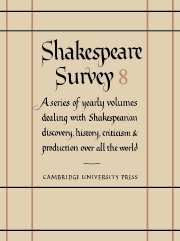Book contents
- Frontmatter
- The Interpretation of Shakespeare’s Comedies: 1900–1953
- Comic Form in Measure for Measure
- Troilus and Cressida
- As You Like It
- The Integrity of Shakespeare: Illustrated from Cymbeline
- Shakespeare’s Comic Prose
- A Note on a Production of Twelfth Night
- Producing the Comedies
- The New Way with Shakespeare’s Texts II. Recent Work on the Text of Romeo and Juliet
- The Significance of a Date
- Of Stake and Stage
- The Celestial Plane in Shakespeare
- International Notes
- Shakespeare Productions in the United Kingdom: 1953
- Shakespeare at Stratford, Ontario
- Plays Pleasant and Plays Unpleasant
- The Year's Contributions to Shakespearian Study 1 Critical Studies
- 2 Shakespeare’s Life, Times and Stage
- 3 Textual Studies
- Books Received
- Index
- Plate section
The Integrity of Shakespeare: Illustrated from Cymbeline
Published online by Cambridge University Press: 28 March 2007
- Frontmatter
- The Interpretation of Shakespeare’s Comedies: 1900–1953
- Comic Form in Measure for Measure
- Troilus and Cressida
- As You Like It
- The Integrity of Shakespeare: Illustrated from Cymbeline
- Shakespeare’s Comic Prose
- A Note on a Production of Twelfth Night
- Producing the Comedies
- The New Way with Shakespeare’s Texts II. Recent Work on the Text of Romeo and Juliet
- The Significance of a Date
- Of Stake and Stage
- The Celestial Plane in Shakespeare
- International Notes
- Shakespeare Productions in the United Kingdom: 1953
- Shakespeare at Stratford, Ontario
- Plays Pleasant and Plays Unpleasant
- The Year's Contributions to Shakespearian Study 1 Critical Studies
- 2 Shakespeare’s Life, Times and Stage
- 3 Textual Studies
- Books Received
- Index
- Plate section
Summary
Of all the plays in the Shakespeare canon there is, perhaps, not one which, at first sight, presents quite such a glorious conglomeration of styles as Cymbeline. It is not surprising, therefore, that a vigorous tradition of doubt exists, that Furness and Granville-Barker in the twentieth century found themselves rejecting as non-Shakespearian all those things which Pope and Hanmer had already disposed of in the eighteenth. Hence, conjecture has played merrily around a lost play which Shakespeare half-heartedly refashioned; a collaborator; a Shakespeare bored to death; a Shakespeare drunk with the new wine which Beaumont and Fletcher were pouring into old bottles. It is unlikely that any of these possibilities will long survive in the convictions of any reader who cares to work through the complex body of source material which lies behind Cymbeline, for, pace Dr Johnson and his followers, the construction of the play, when viewed in relation to the basic raw material, is altogether too uniform to admit of more than a single creative activity—and one that is neither drunk nor bored.
- Type
- Chapter
- Information
- Shakespeare Survey , pp. 52 - 56Publisher: Cambridge University PressPrint publication year: 1955

